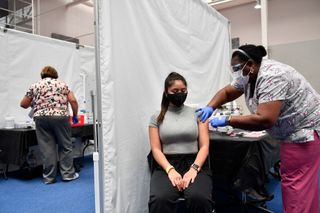
A nurse administers a dose of the Moderna Covid-19 vaccine at a clinic at a vaccination site at Loyola Marymount University on March 8, 2021. (Image credit: PATRICK T. FALLON/AFP via Getty Images)
Two doses of either the Pfizer or Moderna COVID-19 vaccine were 90% effective at preventing infection with the coronavirus that causes COVID-19 in a “real world” study of U.S. health care and frontline workers.
The study, from the Centers for Disease Control and Prevention (CDC), also found that a single dose of either vaccine was 80% effective at preventing infections with the virus.
The results, published Monday (March 29) in the CDC journal Morbidity and Mortality Weekly Report, are consistent with earlier clinical trial data on the vaccines.
“These findings should offer hope to the millions of Americans receiving COVID-19 vaccines each day and to those who will have the opportunity to roll up their sleeves and get vaccinated in the weeks ahead,” Dr. Rochelle Walensky, director of the CDC, said in a statement. “The authorized vaccines are the key tool that will help bring an end to this devastating pandemic.”
The new study analyzed information from nearly 4,000 health care workers, first responders and other essential workers in six states from Dec. 14, 2020, to March 13, 2021. Each week, the participants took a COVID-19 test, regardless of whether they had symptoms.
During the study period, 75% of the participants received at least one dose of the Pfizer vaccine or the Moderna vaccine, both of which are mRNA vaccines.
Overall, there were 161 COVID-19 infections in unvaccinated participants, compared with eight infections in those who were partially vaccinated, meaning they were at least two weeks out from their first shot. Just three people who were fully vaccinated, meaning they were at least two weeks out from their second shot, got COVID-19. (The researchers excluded cases that occurred in the 13 days after people received their first or second dose, since it takes about two weeks for people’s immune systems to respond to the shot.)
The researchers’ analysis revealed that two doses of the Pfizer or Moderna vaccine reduced the risk of infection by 90% and that a single dose reduced the risk of infection by 80%.
Earlier clinical trials showed similar results, finding that two doses of either mRNA vaccine had an efficacy rate of around 95%. However, these clinical trials looked only at symptomatic COVID-19 infections, while the new study also included asymptomatic infections. (Around 10% of infections in the new study were asymptomatic.)
The findings “demonstrate that current vaccination efforts are resulting in substantial
preventive benefits among working-age adults,” the authors concluded. (About 72% of study participants were ages 18 to 49 years old.)
The CDC plans to conduct more studies of COVID-19 vaccine effectiveness in various populations and examine the vaccines’ effectiveness at preventing not just illness overall but also doctor’s visits, hospitalizations and deaths from COVID-19.
By


